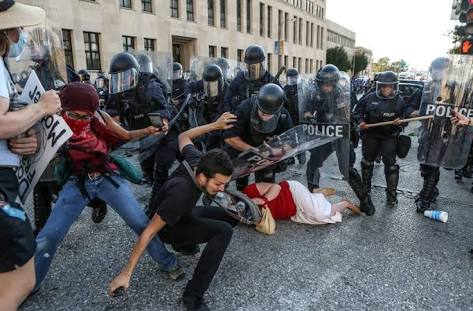This article is written by Jasmine Madaan, from Vivekananda Institute of Professional Studies (VIPS). This is an exhaustive article which describes the various places where one can complain against people who are illegally violating a curfew or lockdown.
Table of Contents
Introduction
The downhearted truth is that breaking the law isn’t something new for India. Now more than ever it is important for people to understand that a lockdown is to prevent them and the country from getting trapped into the horrendous arms of coronavirus. Yet if you find someone violating the lockdown or curfew then what should you do as a responsible citizen? To whom should one complain? This article will provide answers to these questions.
Where can I complain against a person who is illegally violating a curfew or lockdown?
Firstly, it is important to know the difference between a lockdown and a curfew. In a lockdown, four or more than four people are not allowed to gather in the lockdown area whereas in a curfew, people are not allowed to come out of their houses for a specific duration of time. Essential commodities can be availed in a curfew only during a particular time specified by the government whereas in lockdown it can be availed anytime without clustering. Punishment level is graver in case of violation of curfew than a lockdown.
 Click Here
Click Here
Police
Police are the most essential team to ensure enforcement of law and order in the country. It is seen that police are continuously persuading people to confine themselves within their homes as it is their duty to maintain peace and protect the citizens of the country. One can report to the police about the violation of the lockdown or curfew. The All India helpline number of police is ‘100’. ‘112’ is the National Emergency Number. Different states have their own helpline numbers as well. One can either complain by calling the helpline number, writing an email to the respective email IDs of the state’s police or by sending a message, video or photograph on WhatsApp. Here is a list of helpline numbers of the different states or Union Territories released by the Ministry of Home Affairs on April 2, 2020:
|
State/ Union Territory |
Helpline No. |
|
Andhra Pradesh |
0866-2410978 |
|
Arunachal Pradesh |
104 |
|
Assam |
104 |
|
Bihar |
104 / 0612-2217681, 2233806 |
|
Chhattisgarh |
0771-282113, 2446607, 2440608 |
|
Goa |
104 |
|
Gujarat |
104 / 079-23251900, 23251908 |
|
Haryana |
0172-2545938 |
|
Himachal Pradesh |
104/ 077-2628940, 2629439 |
|
Jharkhand |
104/ 181/ 0651-2282201, 2284185, 223488 |
|
Karnataka |
104/ 080-46848600 / 1075 12 |
|
Kerala |
0471-2552056, 25521056 |
|
Madhya Pradesh |
104 / 1075/ 181/ 0755-2411180,2704201, 0729-22344 |
|
Maharashtra |
022-22024535 |
|
Manipur |
1800-345-3818 |
|
Meghalaya |
108/ 0364-2224100, 2590623 |
|
Mizoram |
102 |
|
Nagaland |
0370-2291122, 2270338 |
|
Odisha |
104, 0674-2534177 |
|
Punjab |
104 |
|
Rajasthan |
0141-2225000, 2225624 |
|
Sikkim |
104/ 03592-284444 |
|
Tamil Nadu |
044-29510500, 25615025 |
|
Telangana |
104/ 040-23286100 |
|
Tripura |
0381-2315879, 2412424, 2413434 |
|
Uttar Pradesh |
0522-2237515 |
|
Uttarakhand |
104 |
|
West Bengal |
1800-313-444222, 033-23412600 |
|
Andaman and Nicobar Island |
03192-232102, 234287 |
|
Chandigarh |
0172-2752038, 2752031, 2704048 |
|
Dadra Nagar Haveli, Daman and Diu |
104/ 1077, 0260-2642106, 2630304 |
|
Delhi |
011-22307145 |
|
Jammu and Kashmir |
0191-2549676, 2520982/ 0194-2440283, 2452052, 2457313 |
|
Ladakh |
01982-256462, 257416, 258960 |
|
Lakshadweep |
104/ 04896-263742 |
|
Puducherry |
104/ 1070/ 1077/ 0413-2253407 |
The list of contact details of police of few States is given below:
- Delhi police: Helpline number for COVID-19- 011-23469526 (24×7), Email ID- [email protected];
- Maharashtra police(headquartered at Mumbai)- One can provide the information on CCTNS. Control room helpline number: 22822631/ 22026636/ 22026680; WhatsApp number: 7506777100/ 7506888100;
- UP Police- WhatsApp number: 7570000100 ;
- Punjab Police.
Similarly, one can find the contact details of other States’ police on Google.
But the question arises: what happens after booking them for violation of lockdown?
Section 144 of the Code of Criminal Procedure does not allow gathering of four or more people in the restricted area which is at present, the whole country. This Section empowers the administration specifically a magistrate, sub-divisional magistrate, or any other executive magistrate to impose it. It can be imposed for two months but if the normalcy is still not restored then it can be extended maximum to six months. One cannot organise or attend any mob protests and marches etc. One can’t wander on the roads. The Section also restricts carrying any sort of weapon in the restricted area. Violators of the lockdown can be booked for “engaging in the rioting”. Police can detain the violators. The maximum punishment for violating the lockdown i.e. section 144 is imprisonment for three years.
Section 188 of the Indian Penal Code provides that if anyone violates the order promulgated by a public servant then the police have the power to arrest the violator. If disobedience causes or tends to cause any-
- Obstruction;
- Annoyance or injury;
- Risk of obstruction;
- Risk of annoyance or i.njury.
To any person who is lawfully employed, then the violator can be punished with simple imprisonment for a term which may extend to one month or fine or both. The fine cannot exceed Rs. 200.
Section 188 of the Indian Penal Code also provides that if the disobedience causes or tends to cause:
- danger to human life;
- danger to health; or
- danger to safety;
- Riot or affray.
He shall be punished with imprisonment, fine, or both. Imprisonment can extend to six months and fine to Rs. 1000.
Due to the pandemic, if anyone is seen wandering off on the streets, he/she can be booked under Section 270 of the Indian Penal Code. The Section provides that if anyone is found malignantly doing an act, or knows or believes such act to be likely to spread any dangerous disease to life or infection, shall be punished with imprisonment that may extend to two years or fine, or both. One can be jailed without bail.
Since the whole world is following the principle of social distancing, it is not a smart move to put people in jails therefore police is nowadays opting various different methods to punish the violators:
- People are being punished to do sit-ups while holding their ears;
- Being given a stern warning;
- Police are using lathi charge;
- Detaining the vehicles of the violators;
- In some parts of India, policemen were seen giving roses to the violators to request them to stay at home;
- Police are making people apologize to society by clicking them while making them hold a paper on which it was written ‘I am an enemy of the nation because I will not stay at home’;
- Police are also imposing fines or arresting people who are found on the roads without any valid purpose.
We all know that police can take measures to stop people from violating the lockdown but the law does not authorize police to use unnecessary physical force on people. Even during the first few days of the lockdown, the e-commerce delivery boys were beaten up by the police. Need it to be reminded that at various places while punishing, the rule of social distancing is not being followed at all. The act of police to evacuate protestors at Shaheen Bagh was a part of their duty keeping in mind the overall national public interest. In the previous days, social media has been flooded with posts of police’s brutality against violators. Two deaths of civilians, one of an ambulance driver in Pune and another of a resident of West Bengal, has alarmed the situation. Many journalists, politicians, celebrities, and others have posted on social media about the brutal acts of police and pleaded to the government to take action against such behaviour or at least stop this from happening.
If somebody who has already tested positive for coronavirus or someone who is a suspected case under quarantine violates it, he can be punished under Section 271 of the Indian Penal Code. Under this section, a person can be punished with imprisonment for a maximum of six months, or fine, or both.
The situation during a curfew is a little different. People are not allowed to even get out of their houses except during the relaxation time set by the government. The punishment is severe for its violation and can lead to immediate detention, in some cases even shoot at sight.
Other authorities
One can also reach out to the state authorities who are responsible for ensuring the proper implementation of the lockdown or curfew. It includes state governmental or quasi-governmental bodies. One can either contact them via email or on social media. A recent article of the Economic times states that army troops are being prepared in case they are called to manage the lockdown situation in the country. If this happens, then one can also complain to them.
Social media
Social media is considered to be the strongest tool of the 21st century. One can just sit at their home and communicate with the whole world and can raise their voice against the wrong. Over the past few days, social media platforms are flooding with posts related to the lockdown due to COVID-19.
It is important to note that social media can be used as an effective platform to complain about the violators of the lockdown or curfew. One can post the picture, video or in writing about the place where the violation is being done, the time and the number of people. Twitter, Instagram, Facebook, etc. can be used to report about the violators. While posting on these platforms it is important to tag the authorities i.e. the police of the state, government of the state, action team, and government of India. One can easily search for their official Twitter, Instagram and Facebook handle.
More than ever, the world is going digital these days. A recent example of this is- In Surat, a total of 28 people were nabbed by the Surat police for violation of the lockdown with the help of social media. They were able to resolve 15 complaints made by people on their Facebook page. People had sent pictures along with the location of the violators on the twitter and Facebook pages of the local police. Many people have also complained about people who are still going to the gyms even when they are shut.
Conclusion
When you ignore someone violating the law, you are also at fault for not stopping that person. It is not important to do it yourself but one can definitely approach the competent authorities via different modes available. Use your voice to protect yourself, your family, your nation and the world. Before complaining just make sure of the fact that it is a violation indeed and that the person seen on the roads is not there for a valid reason. Let us not forget that ‘We stand stronger together’.
Students of Lawsikho courses regularly produce writing assignments and work on practical exercises as a part of their coursework and develop themselves in real-life practical skill.
https://t.me/joinchat/J_0YrBa4IBSHdpuTfQO_sA
Follow us on Instagram and subscribe to our YouTube channel for more amazing legal content.
 Serato DJ Crack 2025Serato DJ PRO Crack
Serato DJ Crack 2025Serato DJ PRO Crack









 Allow notifications
Allow notifications


